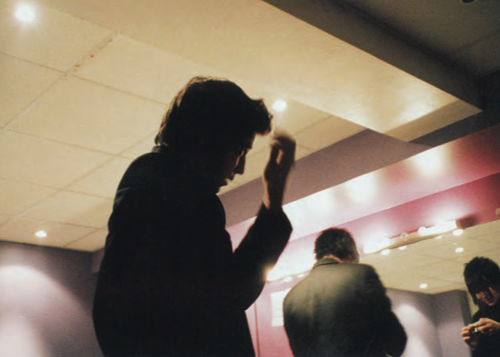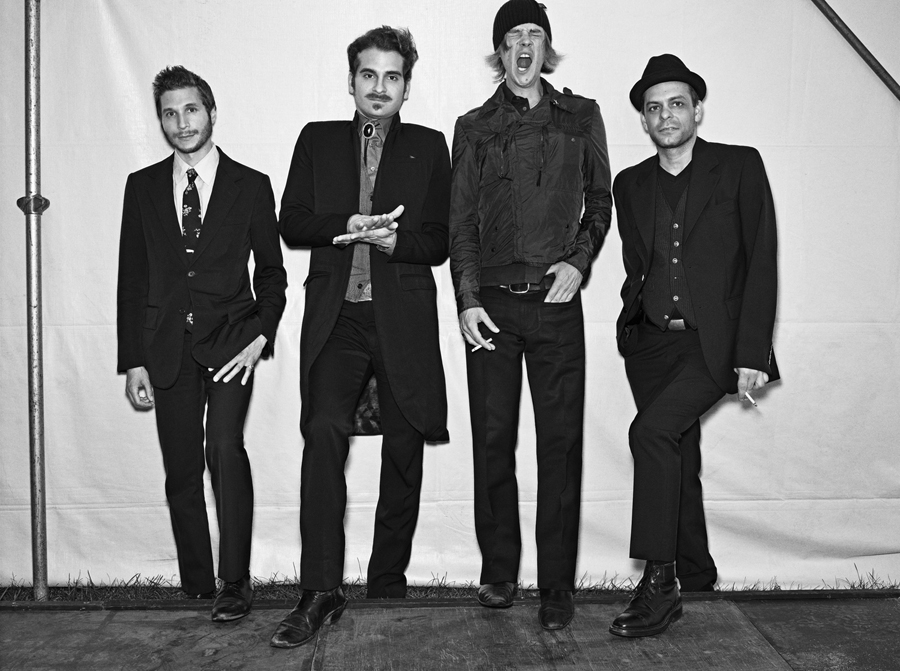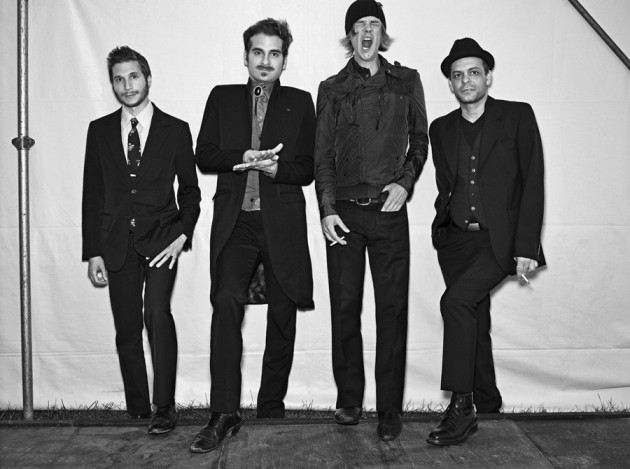Interpol’s seminal post-millenial indie rock record Turn On The Bright Lights turns 10 this week, and, to celebrate, the band has put together an expanded tenth-anniversary edition of the record that includes a wealth of b-sides, demos, and archival photos. In the first part of our two part interview with the band, we sat down with guitarist Daniel Kessler to talk about TOTBL‘s five year gestation period, being a young band in early 00s New York City, and preserving oneself in the wake of creating a classic.
Gabriel Szatan (BPM): I suppose the first question has to be: why now? Why the 10th anniversary and not the 15th, 20th or 25th?
Daniel Kessler: Oh, tenth had a nice round number to it I guess. It wasn’t something we were plotting and planning before we got to the ten year mark but people started talking about it, noticing more than we were. We’re not ones to go through our old stuff – we spend time on a record, release it, do a tour for it and then sorta move on. At first I was a bit hesitant to do something commemorative as I didn’t want to just do it – it wasn’t a marketing ploy – so in truth I wanted to leave it alone; plus I’m more interested in doing something new than going over what’s already done. But once we started really considering it, we wanted to make it really good for our fans or anyone interested in hearing it. So I spent a lot of time digging through the archives, and naturally got into it as you would any project, wanting to make it the best we could. So I don’t know quite why we decided to do it, but once we started we were set on making it worthwhile.
We existed, we were fragile, we could’ve broken up but we didn’t because we enjoyed making music together.
BPM: With regards to uncovering forgotten material, it was mentioned in the press release that in addition to doing so yourself, you asked others to dig through as well – did that procure any interesting results? Did other people have better recordings or earlier demos than the band?
DK: In that context I think it was more looking for photographs. There were a lot of people involved in that time period, stretching from 1997/8 to 2003: not just Turn On The Bright Lights but pre-signing a label deal and making our first album but also a time before that, encompassing the three demos and a Peel Session. It’s a big part of our foundation, spending four or five years without any interest – we existed, we were fragile, we could have broken up but we didn’t because we enjoyed making music together and so to me it’s a big part of us. There are a lot of people from that period we maybe don’t get to see all the time: guys who took our first group photographs, people who were there in the basement of Brownies in 1999, you have to really try and locate people you don’t get to see as often as we would like. I had all the recordings in a box but even when going through it I had forgotten that we had recorded versions of “Stella…” and “Leif…” on the third demo, so it was nice to take that trip and listen to it with some objectivity.
BPM: In amongst the bonus material on the second CD you have the initial demo from June 1998, at which point I was six years old and –
DK: You were six years old? Shit man, fuck, make sure you put that in the interview! Wow. [chuckles]
BPM: Yeah, it’s bizarre to think about that, especially as on that first record there’s a version of “PDA,” which remains to this day one of your most well-loved tracks. I doubt you could have envisioned its longevity and that you’d still be taking it around the world 14 years later, but did it strike you at the time of recording that you might be onto something really good?
DK: You know, “PDA” for me personally was the first song that, when I came up with the progression, felt definably like I was changing as a songwriter at that moment – I had written songs before, recorded demos where I played every instrument except the drums, but I could notice I was doing something different than before, although there was no specific intent. It was actually the first song we jammed on as a band. Like I said, we played our first show in March ’98 but didn’t put our first record until August 2002, and we had “PDA,” played it at our first show along with a lot of stuff that would end up on Bright Lights. Maybe our timing wasn’t right for what was going on in rock and roll or New York City at the time and obviously while the internet was there it was pre-distributing tracks online and certainly before social media, so we were just hoping for an opportunity to make a record. But really you had to be patient and take rejection in your stride – even Matador rejected us two times before they said yes on the third demo, and we never took it personally. Persevering is a big part of a band’s existence, just keep doing it because you really like doing it. So no, I had no reason to believe that “PDA” was something that would give interest to anyone.

BPM: To pick up on what you mentioned there about the long gestation period: looking back your signature style, or certainly that which had crystallised by the time of the debut, was pretty at odds with what was going on in the late 90s. When pushing through the early phases, did you ever think you might never get that chance because you were making music that was out of step?
DK: Y’know, I’m not sure it’s that specific. I didn’t know, but I definitely had the thought that we would never make a record, which was all I wanted to do. At that time I was managing the band, booking all the shows, packaging the demos, sending stuff out and getting rejections from every single record label. I was doing everything I could think of to give us the opportunity to do something a bit different but I had no reason to believe that we’d ever get that. I remember specifically in early 2001 having a pretty good period; it was around the time we were writing “Say Hello To The Angels,” “Obstacle 1,” “Obstacle 2” and “NYC” and much of the latter half of what would be on Turn on the Bright Lights, we were coming into our own and Sam [Fogarino] had been in the band for almost a year. All I ever wanted was to find a band like this with such great chemistry but the chance to make a record and have people hear it was very much secondary to what it meant deep down to me as an artist. That was big enough for me. I had spent a lot of time looking for these guys before I found them, on the quest for several years before. I would have been content if we had just kept doing what we were doing without ever making a record; it wouldn’t have been my preference but I was at peace with that.


